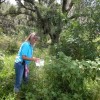Abstract
Tropical soda apple is a prickly shrub native to South America. First reported in Glades Co., Florida in 1988, it later spread to Georgia, Alabama, Louisiana, Texas, Mississippi, Tennessee, North Carolina, and South Carolina. It is a major problem in pastures and conservation areas. Negative impacts of tropical soda apple include reduction of cattle stocking rates, competition with native plants, and the costs associated with its control. Dense thickets of the weed also can disrupt the movement of wildlife. This 4-page fact sheet provides a summary of the major steps of the successful biological control program against tropical soda apple in Florida. The article covers the importance of the weed, identification and biology of the biological control agent, rearing and release efforts, establishment and impact, and efforts to communicate the outcomes of the program to stakeholders. Written by R. Diaz, J. Medal, K. Hibbard, A. Roda, A. Fox, S. Hight, P. Stansly, B. Sellers, J. Cuda and W. A. Overholt, and published by the UF Department of Entomology and Nematology, November 2012.
Unless otherwise specified, articles published in the EDIS journal after January 1, 2024 are licensed under a Creative Commons Attribution-NonCommercial-NoDerivs 4.0 International (CC BY-NC-ND 4.0) license.

